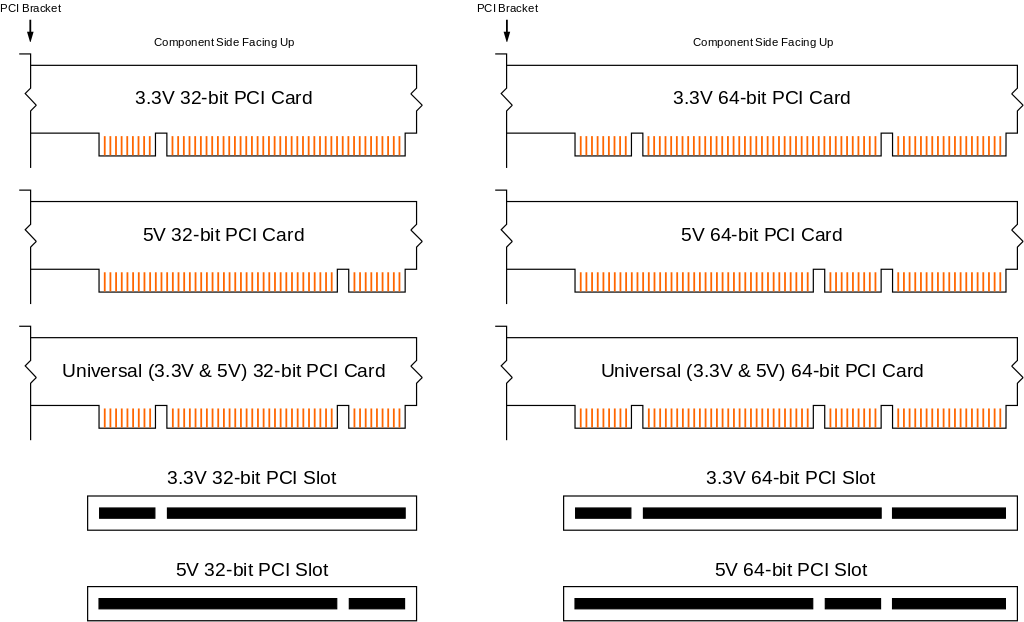http://www.soundonsound.com/sos/may07/articles/pcnotes_0507.htm
many of us know that 2 notches in a pci card usually indicates 3.3v compatibility and the ability for a card to work in 5v slots as well as 3.3v slots (found in the powermac g5) wheras only one notch will indicate that it wont work with higher PCI specs
(pci has different specification versions
http://en.wikipedia.org/wiki/Conventional_PCI)

here we see in 2002 that there were new specs created that dropped support for the older spec cards.
What Does It Mean?
So what, in practice, does all this mean for the average musician? Well, if you have a PCI soundcard that has two notches in its edge connector (the Universal type), you can be confident that it will both fit into and run successfully on the vast majority of modern motherboards. If, on the other hand, you have an elderly PCI soundcard (pre-2002) with a single 5V notch, it may or may not work. As an example, although my Echo Mia card only has a 5V notch, according to the Echo web site (www.echoaudio.com/Support/FAQ.php), all of Echo's PCI products are in fact compatible with 5V PCI, 3.3V PCI and PCI-X connectors, and will thus work with modern PCI 2.3 motherboards. However, someone recently posted on the SOS Forum that while he could physically install his elderly MOTU PCI 324 card in his new dual-core PC, the card wasn't recognised (MOTU do state that it's a 5V-only card on their web site, and that PCI 324 owners can upgrade to the newer PCI 424 card, as they can to the latest PCIe 424 model). Meanwhile, with his Yamaha DS4126 DSP Factory pushed into an expansion slot this new PC wouldn't boot up at all (a similar fate befalls Yamaha's SW1000XG card). The reason for these problems is that all three cards are 5V only.
*** new info (for me anyway)the above bolded enlarged text would suggest that there may be exceptions to the rule that the notch is a 100% indication as to which voltages your pci card can accept!!!!! so the notch should be seen as more of a guideline indicator rather then *Absolute law* because there are exceptions... so each card must be researched indepedantly!
that said, i highly doubt the gina 20 bit card would be compatible with 3.3v - but they did say ALL...? *shrug*
heres the direct quote:
Is my hardware compatible with an Echo product?
Each of our product families requires a different hardware interface to the computer. The interface required by each product family is described below.
Echo 3G and Echo24 family: Layla3G, Gina3G, MiaMIDI - Requires a PCI slot*
*All PCI products are compatible with 5V PCI, 3.3V PCI and PCI-X.
checking the quote it appears to only be in reference to the "3g" + "24" pci cards. which would mean these products are 100% compatible with a powermac g5 or pci2.3 spec pc motherboard aswell.
the echo page also references an issue where ram timing affects whether the card is recognizable by the os as well
http://web.archive.org/web/20070225033708/http://www.echoaudio.com/Support/Technotes/MemoryTiming.phpbut that would probably be more for pcs.. but maybe it is relevant to mdd's as they use DDR and were originally shipped with pc2100/266 ddr but many people use pc3200/400 and pc2700/333 modulles aswell... so if before u think your echo pci card is incompatible with your mdd, u might find it usefull to be aware of this - and try again with the correct speed ram to test just to be sure.. althought its probably more relevant to pc bios settings to do with ram timings. the article was relevant to the following echo cards:
Layla3G, Gina3G, MiaMIDI, Mia, Layla24, Mona, Gina24.
So if you're trying to track down compatibility information for an elderly but still loved soundcard, look for references in its specification to 5V, 3.3V or the required PCI version. For example, a visit to the Lynx web site (www.lynxstudio.com) showed that while the newer Lynx Two, L22 and AES16 soundcards all have twin notches, the older Lynx One has a single 5V notch and requires a PCI buss that's 'Version 2.1 compliant', meaning that it will only run with 5V slots and not with the latest motherboards. If you can't find the information you need, a quick email or telephone call to the soundcard manufacturer should provide the answer.



